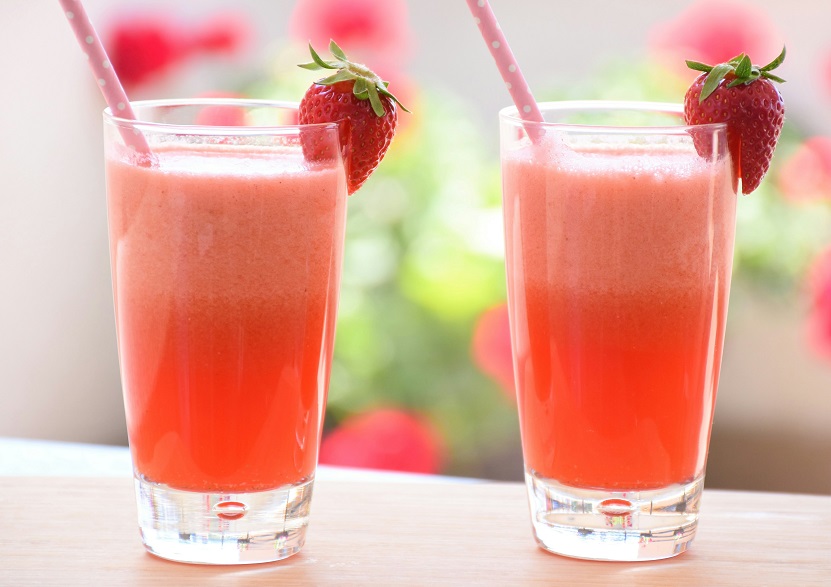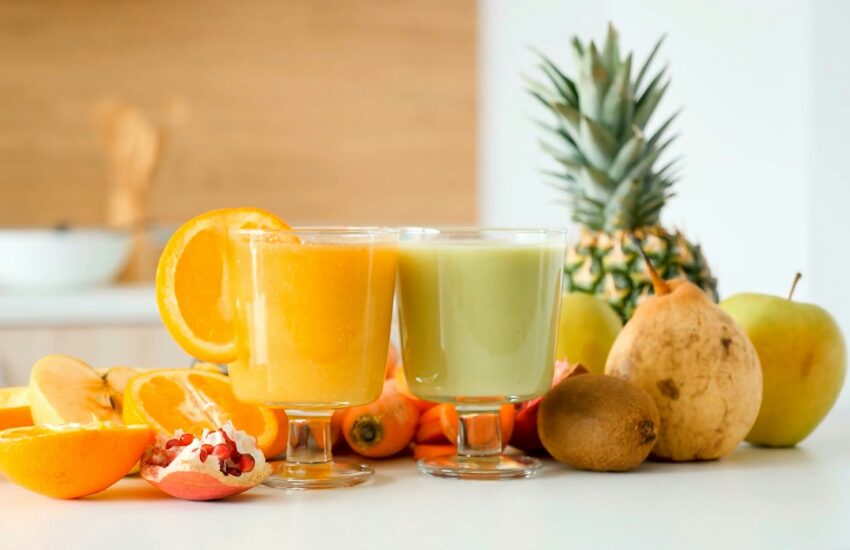Whole Fruit: A Nutrient-Packed, Low-Calorie Option
1. Lower in Calories and Sugar
Whole fruits tend to be lower in calories per serving than fruit juices. For example, an average apple contains about 95 calories, while an 8-ounce glass of apple juice contains around 110 calories—despite both being made from the same fruit. This is because when fruit is juiced, much of its water content is removed, concentrating the sugars. The juice may also contain added sugar, which further increases its calorie content. Fruit vs fruit juice: Which is best for weight loss? Mohit Tandon USA suggested which is better option for you.
In addition, whole fruits have a lower glycemic index (GI) than fruit juices. This means that whole fruits cause a slower, more controlled rise in blood sugar levels, whereas fruit juices cause a faster spike due to the lack of fiber.
2. Higher in Fiber
One of the key reasons whole fruits are superior for weight loss is their fiber content. Fiber is essential for digestion, helps maintain healthy blood sugar levels, and promotes satiety, keeping you feeling fuller for longer. Fiber also helps regulate bowel movements and can reduce overall calorie intake by slowing the digestion process.
When fruit is juiced, much of the fiber is lost in the pulp. For instance, when you juice an orange, the fiber that would help slow the sugar absorption and aid in satiety is discarded. This can lead to faster hunger and potentially overeating later.
3. Increased Satiety
The physical structure of whole fruits requires more chewing and takes longer to eat, which can help promote feelings of fullness. The fiber in whole fruits also contributes to satiety, helping to curb overeating. In contrast, fruit juice, which is often consumed quickly, may not leave you feeling as satisfied. This lack of satiety can lead to consuming larger portions of food later on.
Whole fruits, particularly those with high water content like watermelon, oranges, and apples, are excellent for satisfying hunger without adding excessive calories. – Mohit Tandon
4. Nutrient Density
Whole fruits are packed with vitamins, minerals, antioxidants, and phytochemicals that benefit overall health. They are rich in vitamin C, potassium, and folate, and their natural sugars (fructose) come with additional nutrients that are absent in fruit juice. The process of juicing can also degrade some of these nutrients due to exposure to light and air, meaning fruit juice may not be as nutrient-dense as whole fruit.

Fruit Juice: The Convenience and Potential Pitfalls
1. Caloric Density
Fruit juices, particularly store-bought varieties, can be high in calories and sugar. Even though the juice might come from whole fruits, juicing removes the fiber and water, concentrating the sugar and calories. For example, 8 ounces of orange juice contains about 110 calories, but it requires the juice of 2-3 oranges to make that serving. This is far more concentrated than simply eating the whole fruit, which provides more volume and fullness with fewer calories.
Additionally, many commercially available fruit juices have added sugars or syrups to improve taste, which further increases their calorie content and can contribute to weight gain if consumed in large amounts.
2. Lack of Fiber
As mentioned earlier, fruit juice lacks fiber, which is key for weight loss. Fiber helps to slow the absorption of sugar, ensuring more stable blood sugar levels and promoting feelings of fullness. The absence of fiber in fruit juice means it is digested quickly and can lead to quicker spikes in blood sugar, which could result in hunger soon after consumption, potentially leading to overeating. – Mohit Tandon
3. Potential for Overconsumption
Since fruit juice is consumed in liquid form and can be drank quickly, it’s easier to consume large quantities without feeling as full as you would after eating whole fruit. This can lead to overeating and excess calorie consumption, which can hinder weight loss efforts. Drinking juice doesn’t provide the same sensory satisfaction (chewing, savoring) that whole fruit does, which may leave you less aware of how much you’ve consumed.
4. Less Nutritional Value
While fruit juice contains vitamins and minerals, the absence of fiber and the potential degradation of nutrients during the juicing process means that fruit juice is often less nutritionally rich than whole fruit. Additionally, some fruit juices may be fortified with added vitamins and minerals to make them appear more nutritionally complete, but these are no substitute for the wide array of nutrients present in whole fruits.

The Impact on Weight Loss: Whole Fruit vs Fruit Juice
1. Caloric Control
When it comes to weight loss, controlling calorie intake is crucial. Whole fruits are more filling, thanks to their fiber content, which makes it easier to avoid overeating. They provide a satisfying portion with relatively few calories. In contrast, fruit juices are more calorie-dense and less filling, which can contribute to consuming more calories without realizing it.
2. Blood Sugar Regulation
Blood sugar control is another important factor for weight loss. Whole fruits have a lower glycemic index due to their fiber, which slows the absorption of sugars and helps maintain stable blood sugar levels. This can prevent the insulin spikes that lead to fat storage. Fruit juice, on the other hand, can cause a quicker rise in blood sugar, leading to potential cravings and overeating.
3. Nutrient Density
While both whole fruits and fruit juices provide nutrients, whole fruits are more nutrient-dense overall. They offer not just vitamins and minerals but also beneficial compounds like antioxidants, which are more likely to remain intact in whole fruits compared to juice. These nutrients can support metabolism, promote fat burning, and contribute to overall well-being.
Which is Best for Weight Loss?
Whole Fruit for Weight Loss
Whole fruit is the clear winner when it comes to weight loss for several reasons:
- It is lower in calories and sugar, making it easier to maintain a calorie deficit for weight loss.
- The fiber content helps control hunger, regulate blood sugar, and promote satiety, which reduces the likelihood of overeating.
- Whole fruit is more nutrient-dense, providing vitamins, minerals, and antioxidants that support overall health and metabolism.
Fruit Juice: A Better Option in Moderation
While fruit juice can provide some nutritional benefits, it is typically less filling and more calorie-dense than whole fruit. If consumed, fruit juice should be limited to small portions and should preferably be 100% juice without added sugars. It’s best to choose fruit juice as an occasional treat rather than a daily part of your diet when focusing on weight loss.
Conclusion
For weight loss, whole fruits are a far better choice than fruit juices. They provide more fiber, help control hunger, and offer greater nutritional value with fewer calories. Fruit juices can be consumed in moderation, but it’s important to be mindful of portion sizes and to avoid those with added sugars. By prioritizing whole fruits, you can enjoy the full benefits of fruit while staying on track with your weight loss goals.
